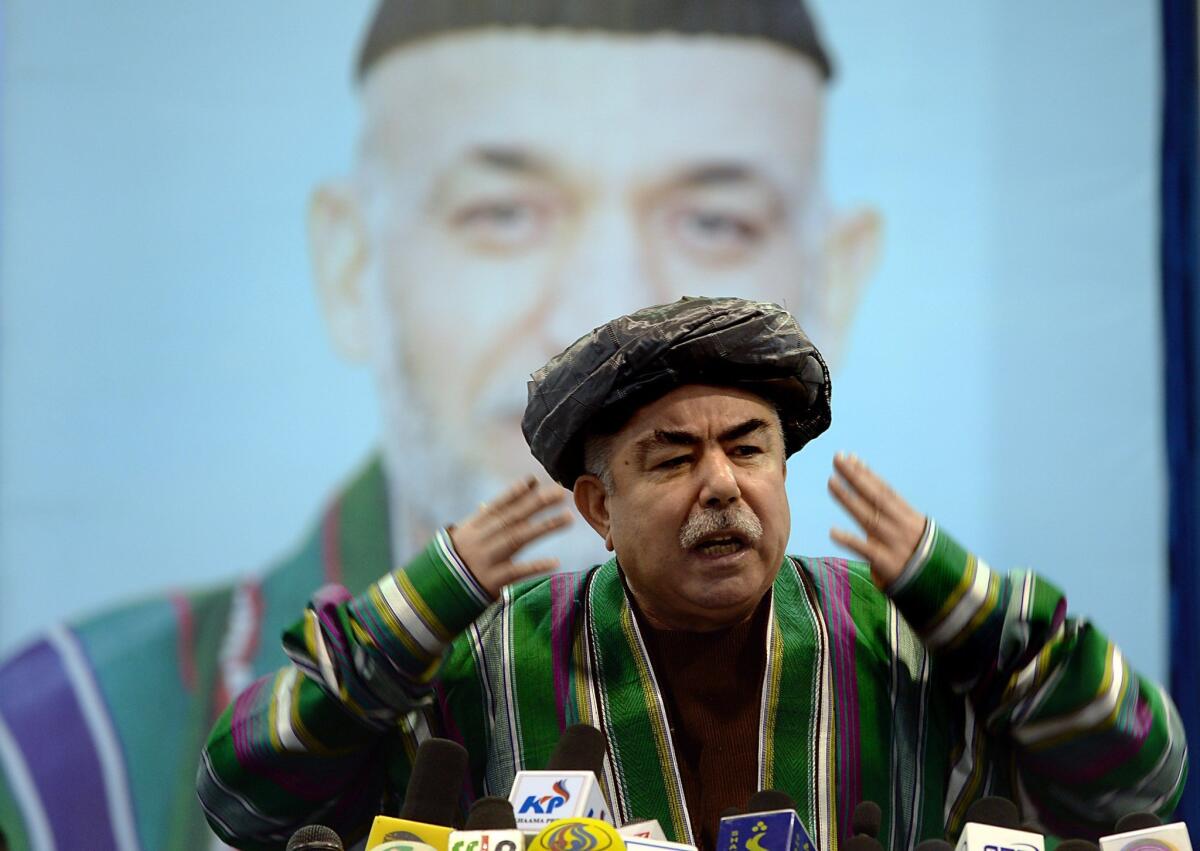Afghan vice president accused of ordering sexual abuse of a rival he beat up in public

- Share via
Reporting from Kabul, Afghanistan — A politician here said Tuesday that he was tortured and sexually abused while being held hostage by Afghanistan’s vice president, the latest development in a sordid episode that has raised serious questions about the rule of law in the country.
Speaking with local media, Ahmad Ishchi leveled the accusations against Abdul Rashid Dostum, a former warlord and militia commander who holds the title of first vice president.
The two men, who are political rivals, got into an altercation Nov. 25 on the sidelines of a game of buzkashi, a traditional Afghan sport akin to polo, in the northern province of Jowzjan. According to witnesses, Dostum stepped on Ishchi’s neck with his foot and threatened to suffocate him.
“He said, ‘Who would care if I killed you here right now?’ ” a witness, 33-year-old Mohammad Zaman, recounted.
Dostum then reportedly held Ishchi hostage for five days at his compound in Sheberghan, the provincial capital. While there, Ishchi told reporters Tuesday, Dostum’s henchmen beat him repeatedly.
“I was tortured by Gen. Dostum’s 10 men and sexually assaulted,” Ishchi said. “The general was ordering his men to do it.”
Ishchi eventually was handed over to provincial intelligence officials, according to a local official who requested anonymity because he did not want to anger Dostum by discussing the episode.
“We treated Ishchi well for six days and got a doctor to prescribe him medication as his legs, hips and face were injured,” the official said. The intelligence agency released Ishchi after mediation by dozens of tribal elders, he added.
Dostum’s office issued a statement denying the allegations of abuse, calling them a plot to defame him. The statement said Ishchi was arrested by Afghan forces on charges of aiding insurgents, a claim Ishchi denied.
“If I have any links with insurgents, the government is welcome to trail me,” he said.
President Ashraf Ghani’s office said late Tuesday that it would investigate Ishchi’s allegations, a move that the United Nations and international diplomats in Kabul welcomed. Afghanistan’s allies have poured millions of dollars into improving the country’s justice system, but corruption and human rights abuses often still go unpunished.
The U.S. Embassy in Kabul said Ishchi’s allegations against Dostum raise “serious concerns.”
“A strong, independent justice system is the cornerstone of every stable society,” the embassy said. “Afghans demand that human rights be respected and the rule of law be upheld.”
The accusations against Dostum were a reminder of the strongman’s brutal past. Once described in a State Department cable as a “quintessential warlord,” he and his ethnic Uzbek militiamen have fought on nearly every side of Afghanistan’s multifaceted conflicts since the 1980s.
During the 2001 U.S.-led military invasion, he helped CIA officers target Taliban fighters but outraged human rights officials, who claimed he let hundreds of Taliban prisoners suffocate inside shipping containers where he was holding them.
When Dostum joined Ghani’s ticket in 2014, it was seen as a sign of political reconciliation. But his unpredictable behavior has continued. In September, his fighters faced off with rival ethnic Tajiks on a Kabul hilltop over the Tajiks’ plans to move the burial site of a long-dead king.
Special correspondent Faizy reported from Kabul and staff writer Bengali from Mumbai, India.
Follow @SBengali on Twitter for more news from South Asia
MORE WORLD NEWS
The world could wipe out malaria. A new report shows why that isn’t happening
More to Read
Sign up for Essential California
The most important California stories and recommendations in your inbox every morning.
You may occasionally receive promotional content from the Los Angeles Times.











